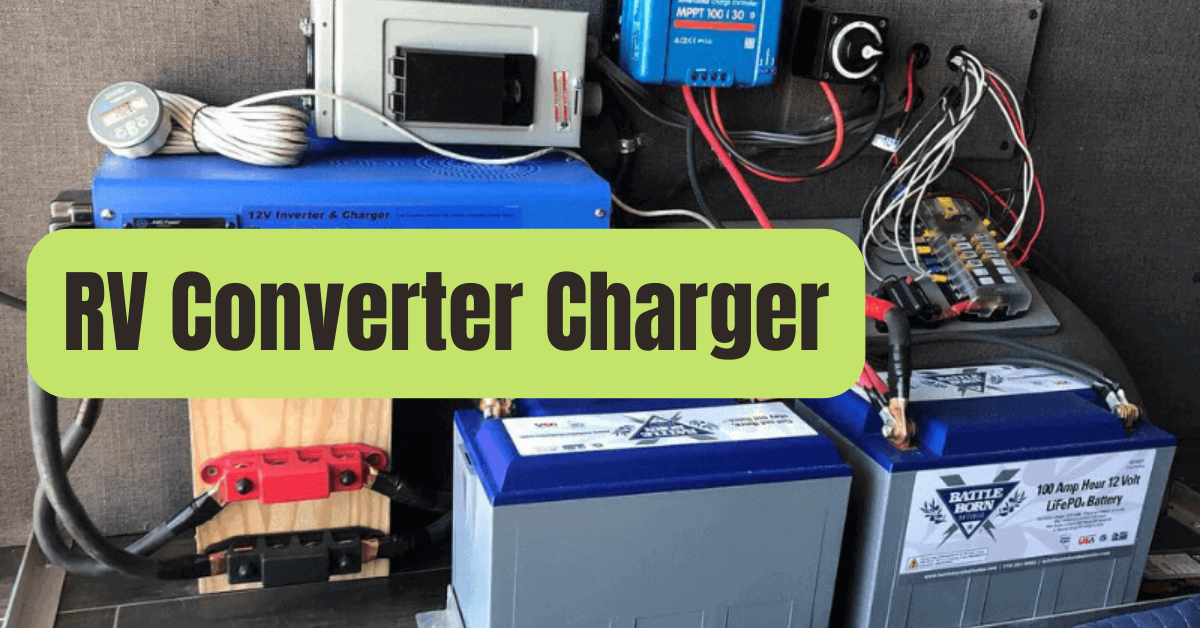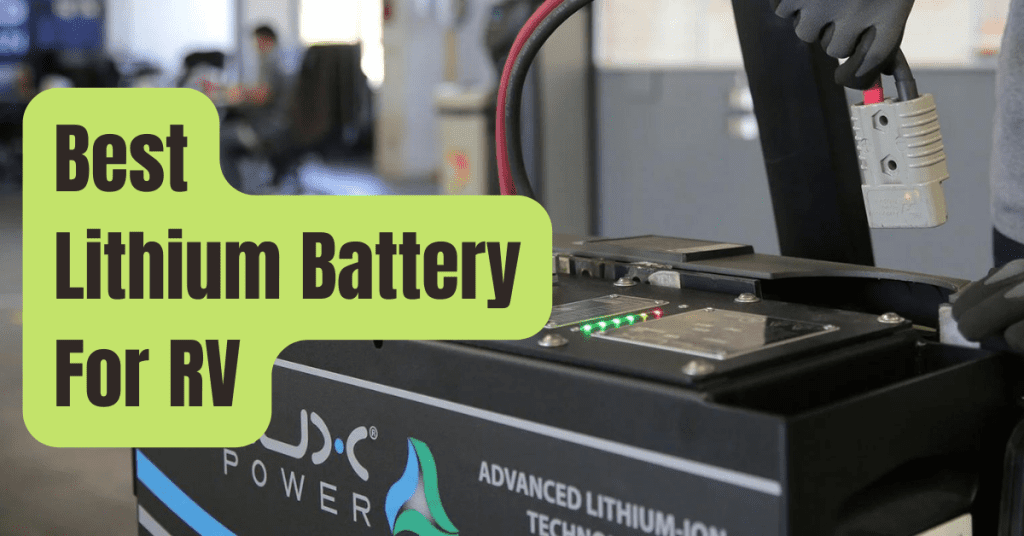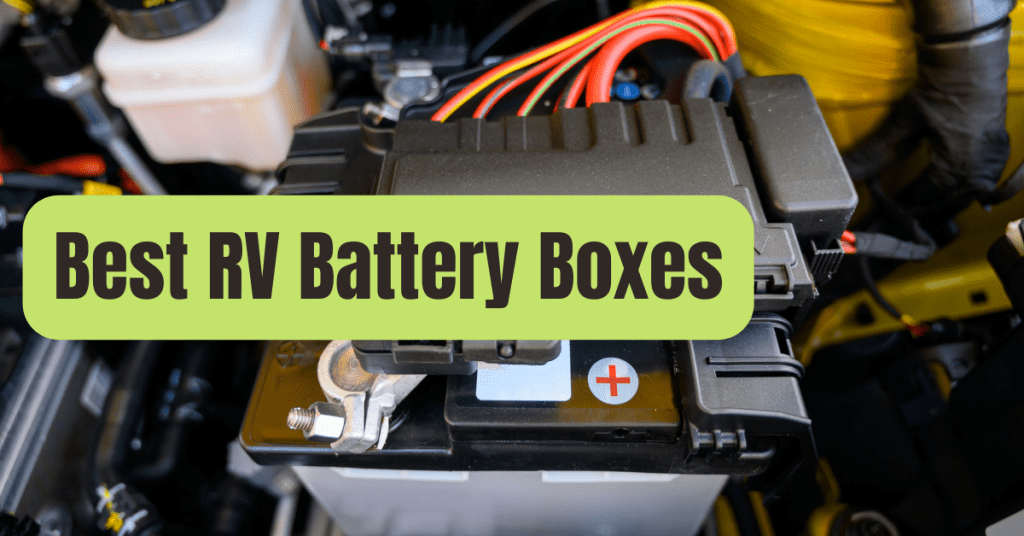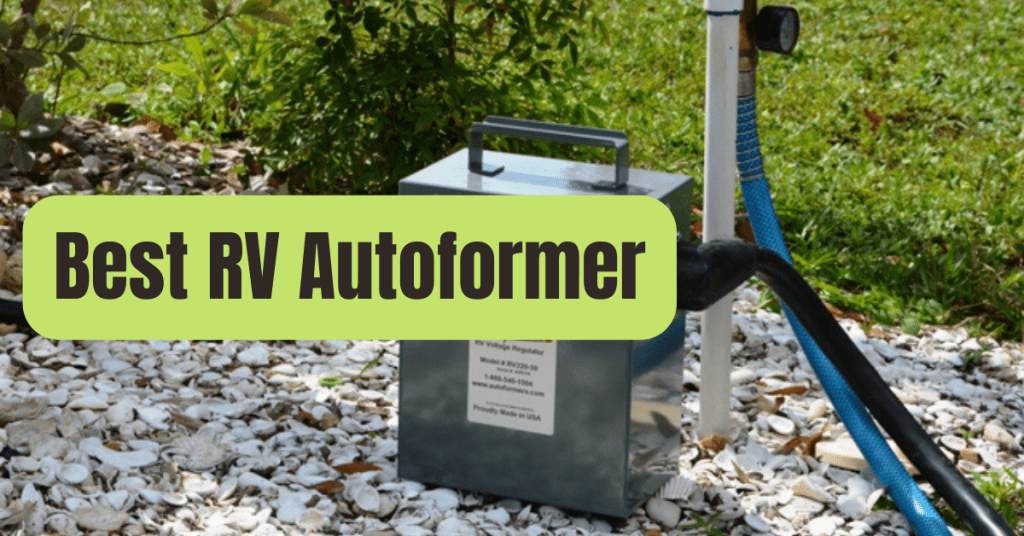Your RV needs a new converter, right? Even so, does your RV have a converter? What exactly is an RV converter?
RV converters are essential parts of your RV’s electrical system that perform exactly what their name implies: they transform ordinary shore power into direct current (DC), which is then used to run gadgets like batteries or televisions that can only operate on DC power.
You may be curious about how precisely converters operate, what kind of converter would be best for you, and finally what converter you should get for your rig since they serve such a crucial purpose.
Along with a list of the top choices, we’ve put up a comprehensive buyer’s guide to help you get started.
However, if you’d like to check our top converters right now, go here:
For a thorough evaluation, scroll down, or continue reading to find out all you need to know about choosing the best converter for your RV!
What Functions an RV Converter?
Still have questions about the operation of your converter and its significance to your RV? Regardless of whether you want to be connected to shore power or not, it is a need for all RVs!
The converter’s function is to transform 120v AC electricity into 12v DC power when you hook your RV into shore power or any other kind of regular electrical source.
To power all of the 12 volt appliances and accessories in your RV, converters are now a regular feature in contemporary RVs.
All of the 12 volt appliances and accessories in your RV will be powered by your RV battery or batteries if you aren’t hooked into shore power or another electrical source.
When you are connected to shore power, a converter will recharge your batteries so they won’t discharge and run the danger of having their lifetime shortened.
A converter is a straightforward plug-and-play addition to any setup or a standard feature.
It functions easily enough.
Because your batteries will continue discharge even when you are hooked into regular shore power, this device is essential if you want to utilize your DC accessories or appliances.
What Distinguishes a Converter from an Inverter?
You’ve now seen a wide variety of RV goods and learnt several new names for them.
How do they all relate to your RV, however, and what do they all mean?
Once you understand it, the electrical system of your RV is really straightforward.
Your first step should be to discover what an inverter and converter are.
As previously mentioned, a converter transforms ordinary shore power into DC battery power, often simultaneously maintaining and charging your batteries.
An inverter performs a similar function, but in the other direction: it converts your DC battery power into normal 120V AC electricity for your RV.
You don’t need to worry about whether everything is functioning correctly since an inverter and converter work together to enhance your RV’s electrical system.
I Don’t Have A Converter In My RV. Do I Need One?
Unfortunately, a converter is not a typical feature for many RV owners.
When my DC-powered overhead fan quit during the first week of testing my antique travel trailer, I’m sure I briefly panicked.
I didn’t know what a converter was, but I soon discovered that it was an essential component of your RV’s electrical system.
A converter may not be required for you if you want to switch almost all of the equipment in your RV to 120V AC shore power.
However, compared to the price of a converter and the availability of these appliances, the expense of converting these appliances can be absurd.
You may not find what you’re searching for in an AC or shore power version since certain appliances and accessories in your RV are built to operate on battery or DC power.
Additionally, a charged battery is necessary for the operation of your RV’s brake lights, tail lights, and other standard vehicle demands.
A converter is a no-brainer in my eyes since you will always need a battery and something to charge that battery.
How Much Will It Cost To Replace The Converter In My RV?
Your RV has a converter, as you now know.
Great! However, after exhausting all possibilities for problems, you’ve found that your RV’s converter is faulty.
Not that great
Like most things in an RV, the price of a component replacement depends on your demands and degree of expertise.
There are several converters available, and you may save some money on installation if you feel confident installing one yourself.
When it comes time to set up your new converter, it can be more difficult to install a converter than you are used to, so you might require expert guidance and assistance.
If you believe it’s too difficult for you to handle, an RV professional can easily install a new converter for you.
Because there are so many converters available, there should be solutions for any budget.
However, you could require a bigger expenditure if you discover that the whole converter has to be replaced and it isn’t a simple remedy like changing the fan or getting a new battery charger.
Although the cost of the converters on this list varies, maybe there is one that fits your budget!
However, the price is entirely determined by the amount of amperage required to power your RV as well as any other features you want from your converter.
The converter, however, is a crucial component of the electrical system of your RV and is well worth the expenditure.
Saving money on installation or a converter that doesn’t output as much electricity as another type may be possible.
You probably don’t need a high output converter since your DC system shouldn’t be powering anything particularly extreme.
Just be aware of the expense of such an update if you decide this is essential for your setup.
Does An RV Converter Need A Battery To Operate?
Are you unsure if your RV converter will function without a battery? It’s possible that not all of you RVers out there will have an answer to this intriguing subject.
The solution may not, however, be what you were looking for.
Your RV converter is designed to transform the energy coming from your vehicle into 12v energy, which your battery then stores for later use.
If you are always connected to shore power, shouldn’t you be able to utilize a converter without a battery?
The simple answer is that you can use 12 volt electricity without a battery and only operate your converter if you are regularly connected to shore power.
Additionally, there are several cases of this technique damaging converters.
How could this be?
Your electrical system is built to store extra electricity and energy in your RV’s batteries for later usage or for times when you have significant energy demands.
Your converter is considerably more likely to burn out if these batteries are not used.
Many RVers have attempted to use their built-in RV converters without a battery, and the majority of them claim temporary success.
To maintain appropriate maintenance and upkeep of your RV’s electrical system, even if your RV is permanently connected to shore power, it is advised that you continue to use your batteries.
Nearly every RV has converters as standard equipment since they are designed to function in conjunction with batteries.
Keep your electrical system happy by leaving the battery compartment alone unless you are having trouble fitting everything in your storage and need it for a vacation you have planned.
Do I Need A Converter And A Battery Charger?
You could feel confused by what everything means while looking for a new converter, particularly the aspects that relate to battery charging.
Are your batteries in need of recharging? Can a converter do that? Or will you need to make further purchases?
The simple answer is that if you want to use any DC-powered devices or features, you’ll need a mechanism to keep your batteries charged.
However, your converter could or might not automatically charge your batteries.
You may want to think about a converter with battery charging capabilities if you don’t currently have a separate battery charger and your converter has to be replaced.
If you want to use your converter to the most extent possible, you must maintain your batteries charged; otherwise, your converter won’t have any energy to convert and use for your rig!
Thankfully, charging is now included into many converters.
While some of these converters may be more expensive than others, you could find it easier and more cost-effective to purchase an all-in-one solution.
You could have better success locating a less expensive converter without smart charging features if you’re used to keeping your batteries charged in your RV and already have a battery charger.
How Much Power Really Do I Need?
As converters sometimes base their pricing on amperage output required, let’s suppose your budget relies on how many amps you can afford.
This is a simple method for controlling your spending, but it all depends on how much amps you really need.
What number may this be?
It will need some arithmetic if you want to be as precise as possible.
You must ascertain which items in your RV run on DC electricity.
Given that several RV equipment operate on both AC and DC power, this won’t be a complete list, but it could be a respectable portion.
Even though you may never find yourself in a position where you have just DC power, it’s a good idea to be prepared in case there is ever a power outage or another issue with the electricity.
Therefore, it is a good idea to account for all appliances when calculating your required amperage!
The starting amperage and operating amperage of your appliances are two separate amperage rates.
The figure that counts more is the initial rate of amps, which is always greater than the running rate.
You may want to think about a higher output converter if your converter is unable to manage the startup amperage of all of your appliances.
Once you’ve done the arithmetic, however, it’s likely that you’ll require a converter with an average amperage output.
Except for the microwave and air conditioner, which seldom operate exclusively on DC power, many appliances don’t need a lot of amps.
It’s wise to consider your power requirements for more than just your converter while using your RV.
When looking for batteries, a generator, and a variety of other items, it will be important to know your typical amperage use.
Knowing how much electricity you require can help you be a responsible camper since the worst that can happen is that you blow a fuse at a campsite!
RV Converter Types
There are several kinds of converters available, each with unique features and compatibilities.
It’s a good idea to choose the one that best fits your requirements, particularly if you’re replacing an outdated or damaged converter! These are some of the most typical converter kinds, but to discover the one that best meets your requirements, you may need to do further study.
#1. Dual-Stage Or Intelligent Converter
There is a converter out there for you if you’re seeking for one that can handle everything.
A multi stage converter is a fantastic contemporary converter that can charge your batteries, maintain their level consistently, and turn off when they are fully charged.
Given their capabilities, multi stage converters are the preferred option for the majority of people nowadays.
Every step of the conversion procedure is taken care of by this converter, giving you complete peace of mind.
A fully charged battery is content, and a multi stage converter is also aware of the dangers of an overcharged battery.
Older RVs often feature single stage chargers, which are less capable than multi stage chargers.
One-stage converters or chargers, for instance, can only handle a significant bulk charge.
These converters often overcharge your batteries, which may result in lasting harm.
This may be avoided and your batteries will be protected for a longer time with a multi stage converter.
#2. Converter with High Output
Do you need many fully charged batteries and enough power to operate bigger DC-powered appliances? Your demands could be best served by a high output converter.
This converter is designed to work hard for you.
It is the ideal converter for tougher environments and the greatest choice if you want a high energy output for your DC accessories or appliances.
If you have many batteries that need charging, this converter also helps them all.
This converter is a fantastic option to take into account if you anticipate having high energy needs for your 12 volt system.
#3. Converter for Deck Mount
A deck mount converter is the only option if you want a converter that can be mounted almost anywhere.
This converter may be mounted anywhere wires can reach it, as the name would imply, so you don’t have to worry about placing it in an awkward location.
Since most conversions have significantly different setups from regular RVs, this converter could be the ideal choice for your customized or converted vehicle.
Many RVers find it intriguing to have the flexibility to place a converter on a wall, behind a seat, or both!
#4. Converter For A Distribution Panel
Do you need a converter replacement for an older device? Are you trying to make a simple switch? Investigate distribution panel converters; they can be the best option for you!
Most distribution panel converters may be placed in the same location and are designed to replace older units.
You’re receiving an improvement in every aspect since they are more recent and effective than outdated types of converters!
Distribution panel converters have the ability to power your appliances softly while also charging your batteries effectively.
You won’t need to worry too much about energy loss because of their efficiency.
How To Maintain The Converter In Your RV
For the health and longevity of your converter, whether you currently have one or intend to buy one for your RV, maintenance and care are crucial! How should the converter in your RV be maintained?
There are a few things you can do to increase this useful device’s lifespan.
Keep in mind, too, as you continue reading, that maintaining your converter also requires maintaining the batteries in your RV.
Maintain The Cooling Fans On Your Converter
The cooling fan is one of the most crucial parts of your converter.
If you hadn’t previously realized, converters produce a lot of heat while doing their intended function—converting energy.
This implies that the cooling fan, which is a need for all converters but often the first component to fail, is always present.
It’s not too difficult to take care of your fan.
Your converter requires regular cleaning and maintenance, just like any other fan used to cool electrical gadgets.
Keeping the fan blades free of dust and debris is a simple repair you may carry out as part of your maintenance procedure.
With certain converters, this could be a little challenging process since the fans might be more difficult to reach than other components.
However, you can find the procedure simple for you if you use canned air or other electronic cleaning solutions.
You may need to contact an RV repair facility to get your converter fan fixed if it isn’t working properly or has stopped working altogether.
Without a fan, your converter cannot operate at its maximum potential and is unlikely to last very long.
Maintain The Batteries In Your RV
The strength and lifespan of your converter are closely related to the condition of your RV’s batteries.
Although no RV battery is intended to live forever, you may give it a fair amount of care to lengthen its lifespan and, therefore, that of your converter.
No matter how many batteries you use to power your RV, it’s crucial to take care of them.
Corrosion, inappropriate off-season storage, and incorrect charging may all harm batteries.
However, each of these issues has an easy fix, so it would be worthwhile to take these steps if you want to prolong the lifespan of your batteries and converter.
The most frequent problem with maintaining RV batteries is corrosion, which is also the simplest to resolve.
Don’t panic if you see any corrosion or sulfation of any kind.
Sulfate crystals are formed on any portions of the lead plate of a battery during the usual charging and discharging procedure.
If you see these crystals, the simplest thing for you to do is to clear them off.
Disconnect your battery, buy a terminal cleaner, or prepare your own with water and baking soda, then use a metal scrub brush and the mixture to remove the corrosion.
Even terminal sealant spray is available to prevent corrosion in the future, helping you save time and money the next time repair is required.
Improper off-season storage is another reason for battery failure.
For best health and lifespan, your RV’s batteries should be kept indoors; thus, you should disconnect them while putting your RV away for the winter.
However, you may not have a specific area in a garage or workshop for them because the batteries need still be maintained at a full charge.
This won’t be a big deal, as RV batteries have been known to last a season or two inside one while still mounted and uncharged.
If you reside someplace chilly, you must take out and store your batteries.
Wintertime freezing of batteries may result in irreversible damage to both the batteries and perhaps your converter.
The appropriate charging of your RV’s batteries is the last thing you should do.
Although it may seem obvious, batteries are often overcharged or undercharged.
There are several reasons why this can occur, but buying a converter or battery charger that switches off automatically after your battery is completely charged is a simple fix!
Never hesitate to carry out these additional maintenance procedures because happy batteries equal a happy converter.
For Your RV, the Best Converters
Do you know what a converter is and why you need one with confidence? Do you have a firm understanding of your individual requirements and the kind of converter that would work best for your RV lifestyle? Let’s examine some of the top RV conversions in further detail.
#1. Best Overall: Powermax 110 Volt to 12 Volt DC Power Supply Converter Charger for Rv Pm3-55 (55 Amp)
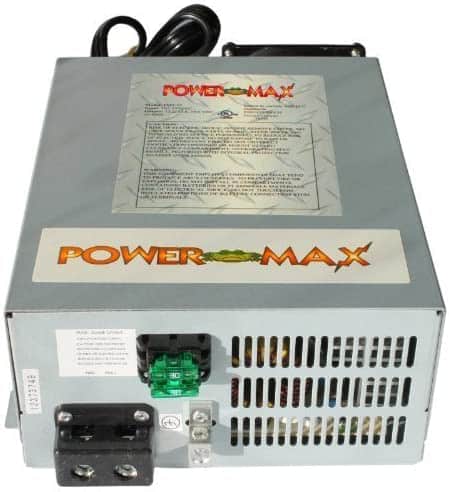
Pros
- Simple to install
- 3 step intelligent charging
- Portable and lightweight
Cons
- Possible fan noise
The reviews are in, and they show that the Powermax 110 Volt to 12 Volt DC Power Supply Converter is a top pick for your setup.
To provide you the peace of mind you need while charging your batteries and appliances, this converter has cutting-edge 3 Stage Smart Charging and configurable power supply modes.
Any battery type may be properly charged and maintained with this converter, which also produces extremely clean DC power.
To meet all power needs, the PowerMax PM3 Series is offered in a broad variety of amperage sizes, as well as 24V, 48V, and 12Vdc – 220Vac types.
With a power output of up to 55 amps, this specific model should have no issue meeting the majority of your RV demands.
Depending on your batteries and the requirements involved, PM3 Series converters may also be coupled in a series or parallel to achieve even greater power outputs.
Additionally, this converter has a fixed output mode with a voltage range of 13.0 Vdc to 16.5 Vdc.
Additionally, it has a current-limiting design that turns off power automatically in overload or short-circuit situations.
Concerned that setting up this converter would be difficult? With built-in mounting flanges and an AC power cable that plugs into a typical 110/120v socket, this item is easy to install.
It should be a little converter that fits most devices since it is under seven pounds and only 11 x 8 x 4 inches in size!
If you want to use your batteries as your primary source of power, this converter may not be the ideal choice for you.
Obviously, this camping style isn’t very environmentally friendly, yet reports on this converter’s amperage range widely.
Although it states 55 amps, several reviews report that number was never achieved for them.
In any event, this inexpensive converter is enough for the requirements of the typical camper.
For those of you seeking dependability and simplicity, it appears like a no-brainer given its simple installation and operation!
#2. Best Existing Converter Replacement: WFCO WF8955PECB Black 55 Amps Power Center Converter Charger
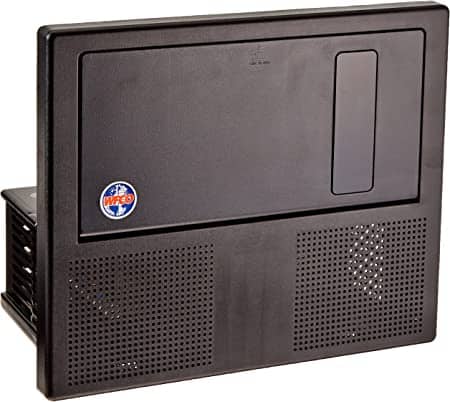
Pros
- Old power centers are directly replaced.
- Budget-friendly
- Favored by RVers
Cons
- Installation may be a bit challenging.
- It may not fit all RVs
For those of you looking to replace your current power center, this converter was created.
A typical brand and design of converter supplied at RV repair facilities is the WFCO WF8955PECB Black 55 Amps Power Center Converter Charger, which is sometimes substantially more expensive if purchased from an RV store.
Why is this converter a standard in RVs?
This power supply operates quietly and is guaranteed to only activate the cooling fan when necessary.
The FCC Class B compliance for this variant of the converter, which implies that it does not interfere with radio, television, or other signals, is another benefit of the converter.
This converter’s automated three-stage battery charging mechanism, which extends the life of your battery with three nominal voltage output settings, is an additional benefit.
There are three of them: a 14.4 VDC range “bulk” charge mode, a 13.2 VDC range “float” mode, and a 13.6 VDC range “absorption” mode.
Your electronics and other appliances will be safe should the converter short circuit or fail since electronic current limiting immediately turns off the power under overload or short-circuit circumstances.
If this power center resembles the converter already present in your RV, installing it should be quick and straightforward.
While some reviewers found installation to be difficult, others thought it was a perfect plug-and-play solution for your system.
It can come down to your degree of expertise, so if in doubt, get a specialist to install it!
Because it is designed to immediately replace earlier units in certain rigs, the proportions of this converter could be ideal for your RV.
When browsing around, bear in mind that the measurements (14 x 11.88 x 8.25 inches) may not be what you’re looking for.
#3. Best Deck Mount Converter: WFCO WF-9855 WF-9800 Series Deck Mount Converter Charger
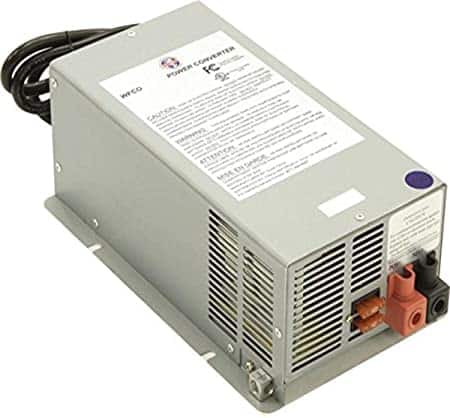
Pros
- Diminutive and deck mountable
- A reasonable (if you install yourself)
- Operating quietly
Cons
- Deck mounted may not be suitable for all users.
This WFCO WF-9855 WF9800 Series Deck Mount Converter is a customer favorite—at least as of the time of writing! I very seldom run across items with five star ratings across the board! If you’re looking to install a converter in your rig for the first time, deck mounted converters are a fantastic option, and WFCO devices are unbeatable!
With a weight of only little more than four pounds and measurements of 11.6 x 6.5 x 4.3 inches, this converter should be simple to install anyplace in your vehicle.
It uses a cutting-edge 3-stage charger and offers clean DC power in the 35 to 75 amp range.
And like the majority of WFCO converters, it only turns on its cooling fan when the system is under a heavy electrical demand.
Additionally, WFCO devices include completely insulated DC connections that are open-top designed for simplicity and fast, practically painless installation.
If you feel comfortable installing it yourself, this deck mount converter has a straightforward design and is extremely reasonably priced.
This brand is available at many RV stores, but installation will cost significantly more, so it could be beyond of your price range.
But WFCO has made it simple for you to install on your own! There are adequate videos and instruction manuals available to get you where you need to go, but some reviews sometimes mentioning that their customer support line is weak.
There is absolutely no doubt that this converter will perform as promised.
Simply connect it, and your device should convert DC power for many years to come!
#4. Best Smart Converter: Progressive Dynamics PD9260CV Inteli-Power 9200 Series Converter/Charger with Charge Wizard
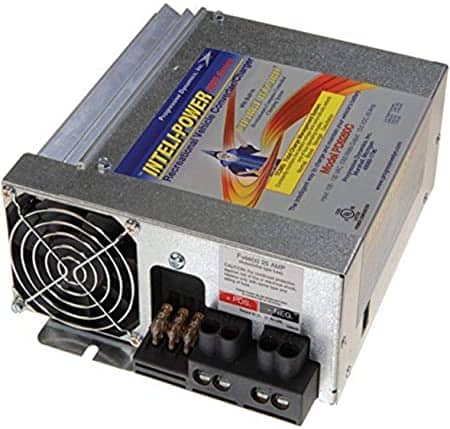
Pros
- Many clever features
- Design that is small and light
- Trustworthy brand
Cons
- Not cost-effective
- Installing smart features can need assistance.
What is a Charge Wizard, you ask? After learning, you could decide against purchasing any other kind of converter! A premium smart converter with excellent evaluations is the Progressive Dynamics PD9260CV Inteli-Power 9200 Series Converter.
Although your budget may not be the greatest lover of this converter, some of these characteristics are just unbeatable.
The Inteli-Power 9200 Series has a built-in Charge Wizard that continuously checks the voltage level and maintains your battery, so you never have to be concerned about its condition again.
All 12 volt lighting and appliance circuits get filtered DC power from these solid-state converter/chargers, ensuring safe and dependable operation.
Additionally, this intelligent converter has reverse battery protection, which guards against harm brought on by a faulty (reverse) battery lead connection.
When maximum capacity is achieved, electronic current limiting automatically lowers output voltage to safeguard your investment and provide ongoing peace of mind.
More features are required?
Additionally, your converter will be protected from voltage surges or spikes exceeding 135V by high voltage protection.
Additionally, it includes low line voltage safety, which immediately switches off your converter in the event that the input voltage is inadequate to prevent harm to your appliances.
A variable speed intelligent cooling fan automatically checks the temperature of the converter and turns on the fan at the appropriate speed.
This smart converter is unbeatable if you’re seeking for cutting-edge technology despite the fact that so many of its features come at a premium price.
#5. Best On A Budget: Powermax PM4 55A MBA 110V AC to 12V DC 55 Amp Power Converter with Built-in 4 Stage Smart Battery Charger
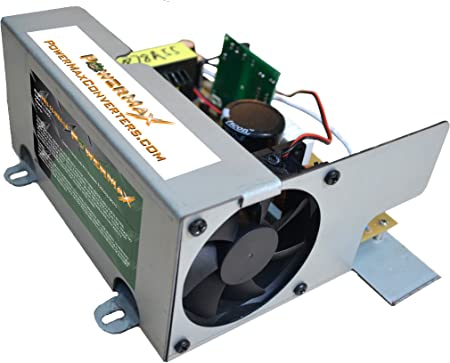
Pros
- Reasonably priced
- Several intelligent charging features
- Small plug and play architecture
Cons
- Compared to the other items on this list, the design is a little more complicated.
On a tight budget yet hoping to purchase the finest converter you can find? The Powermax PM4 55A MBA 110V AC to 12V DC 55 Amp Power Converter stuck out to me despite the fact that several converters are comparable in terms of cost and features.
It continues to be at the lower end of the pricing ranges available on this list without sacrificing functionality.
An RV’s AC and DC power distribution center may hardwire this converter device into it.
You don’t need to watch over your batteries throughout this procedure since the integrated smart charger automatically balances output between the various charge rates of Bulk (14. 7V), Absorption (13. 8V), and Float (13. 2V).
The PowerMax PM4 Series offers high output, dependable, safe, and clean DC power with even additional features including reverse polarity, overload, and temperature protection.
It’s easy to understand why PowerMax is one of the most well-known RV converter manufacturers in the industry.
The maker suggests this converter as a perfect swap for any WFCO 8900 Series and the majority of other RV converters.
It should easily fit into most converter positions in your RV since it weighs roughly five and a half pounds and measures 12.3 x 8.7 x 5.6 inches.
You may need to hire a professional if the construction and installation of this converter prove to be more difficult than the typical install.
PowerMax manufactures trustworthy and complete converters for every price range, so you don’t have to compromise your necessities in order to get secure and healthy DC power!
#6. Best For Large Power Loads or High Output: WFCO WF68100A Deck Mount 100 Amps Converter Charger
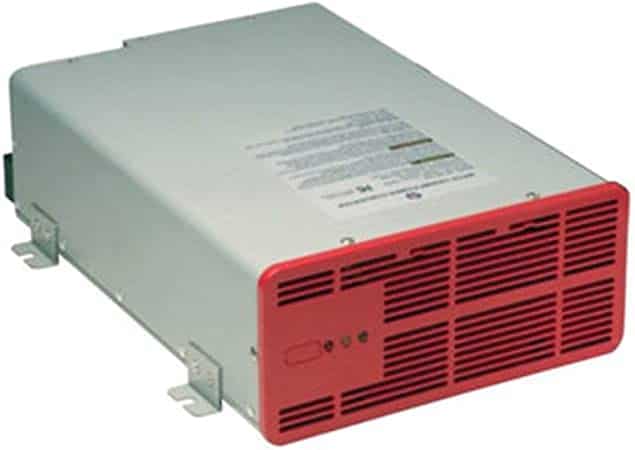
Pros
- Massive amperage
- Simple to install
- Smart fan for cooling
Cons
- Not cost-effective
- Not a battery charger
Trying to operate the majority of your appliances simultaneously, whether they be DC or not? That and much much more are possible with the WFCO WF68100A Deck Mount Converter! This converter is fantastic for those of you with bigger setups and more battery-operated demands since it has an amazing 100 amp load.
This WFCO converter is useful since many big fifth wheels and toy trailers need a converter with an amperage greater than 55 amps.
This little converter weighs just four pounds and maintains a size that is quite universal at 10.3 x 10 x 3.9 inches.
The majority of reviews claim that the plug-and-play converter was simple to install without a professional’s assistance, thus it should be simple to use.
You don’t have to worry about excessive noise inside your little RV since this WFCO converter, like the others on our list, only activates its cooling fan when necessary.
It is said to operate silently, and those of you who had converters put in significant portions of your rig have given it five-star evaluations (under the couch, in the living room wall, etc).
This converter is not a smart battery charger; it is merely a converter.
Battery chargers are a simple and inexpensive purchase, and the amount of amperage they can manage may be just what you need.
If a circuit overloads, it will shut down, and it will let you know when your batteries need to be charged.
This converter is a powerhouse, albeit it may not be ideal for everyone’s requirements, particularly in terms of affordability.
This converter can be the right choice for you if you need more amps than anything else.
#7. Fan Favorite: IOTA Engineering DLS30 30 Amp Power Converter/Battery Charger
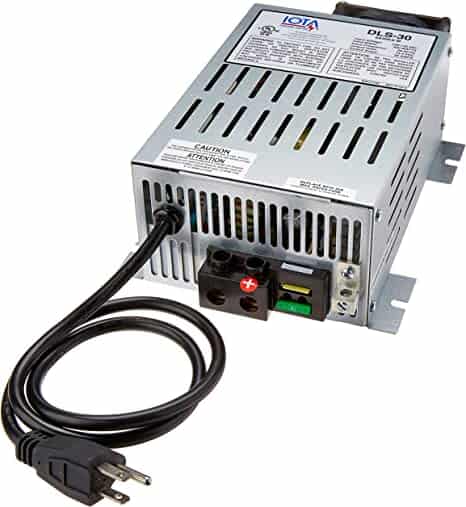
Pros
- Reliable
- Small and discrete
- Simple upgrade for outdated converter
Cons
- Not many advanced features
Are you looking for simplicity, quality, and reviews to support it? Even though we haven’t tested IOTA Engineering’s DLS30 30 Amp Power Converter/Battery Charger yet, it’s a company worth noting.
This converter could be just what you need—compact and effective, understated and silent!
The IOTA DLS30 is industrial-looking and rectangular, measuring 13 x 4.5 x 4 inches and weighing roughly four pounds.
It might be a straight replacement for your existing converter and should suit most places where you can get one! Numerous reviews claim that this is simple to install and easily swaps out older IOTA units seen in toy haulers and other trailers.
The DLS-30 is ideal for use with a high power charger or for directly charging lead-acid batteries.
It offers 400 watts of power at 30 continuous amps.
It doesn’t have a lot of smart charging capabilities, but it does provide surge protection for your most delicate appliances or devices.
This little converter is also inexpensive, which is a comfort considering that it is often found in RVs and that most straight replacements for RV accessories are rather expensive.
Even though it may not have all the capabilities you want, many users say this product will survive for years to come.
#8. Best Distribution Panel or Power Center Converter: Parallax Power Supply 8355 DC Converter/Charger
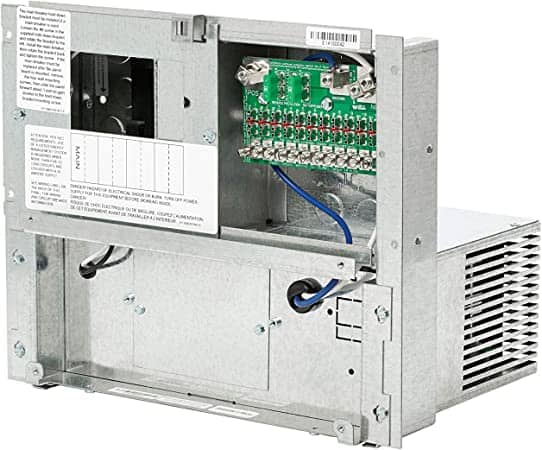
Pros
- Dependable and potent
- Older Parallax models may be directly replaced.
- Smart charging in three stages
Cons
- Very expensive
- Without a professional or some expertise, installation could be challenging.
Therefore, if your converter breaks, you need to replace the complete power center.
Although this appears like a significant purchase, the Parallax Power Supply 8355 DC Converter/Charger will, after the installation is complete, provide you piece of mind!
The three stage, 55 amp converter charger used by the 8300 Series increases output amperage to 30 amps.
It was designed to work on 15 amps of AC power, so you have more than enough power to run other 120V gadgets.
The device includes an 11-position fuse block with blown fuse indications and is constructed with a robust steel shell.
Although doing this installation on your own could be challenging, Parallax is still a significant player in the RV industry.
It’s wise of you to search for a different Parallax power center as a replacement since you could even know it from your present converter!
Given that Parallax promotes extra purchases to enhance the power and charging of your converter, your budget may not allow for this power center.
But if you can invest monetarily in this converter, it won’t let you down for a long time.
#9. Best For Small Spaces And Conversions: WFCO WF-9845 WF-9800 Series Deck Mount Converter Charger – 45 Amp
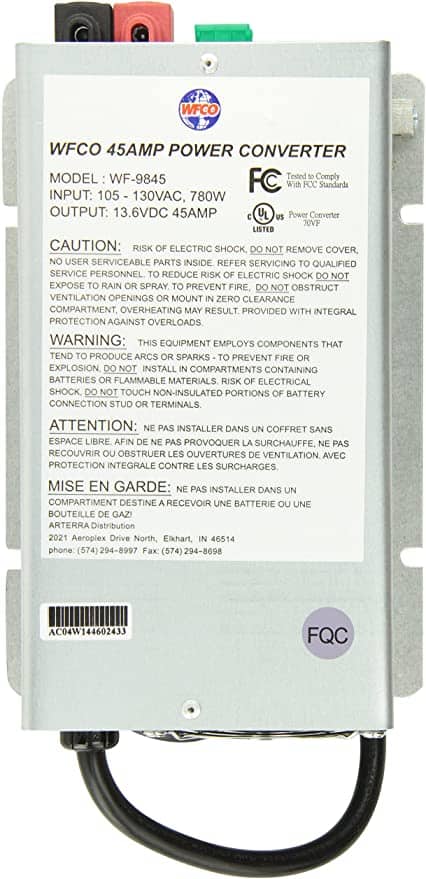
Pros
- Streamlined and deck-mountable
- Reasonably priced
- Intelligent charging system
Cons
- Perhaps a louder fan than others
- Potentially insufficient amperage
You want the smallest converter that money can buy.
If your van conversion requires a dependable but small converter, the WFCO WF-9845 WF-9800 Series Deck Mount Converter Charger might be the prince charming!
Even though there are many converters on our list that are suitable, this little guy is only slightly smaller than the others, has all the essential smart features, and is reasonably priced.
Given that this converter may be mounted on a deck, its dimensions of 11 x 5.88 x 4 inches are nothing to laugh at.
Numerous reviews also note that this is a simple replacement for their current RV converters.
Even though it can only produce up to 45 amps, the ordinary camper generally finds this to be sufficient, and it still has WFCO’s revolutionary three-stage charging method.
If installing this trustworthy and well-known brand proves challenging, you shouldn’t have any problem finding online support!
When compared to the other converters on our list, this one is more affordable, so if you’re searching for a compact and dependable converter, you won’t have to give up the majority of your wish list items.
#10. Best Converter Replacement: Parallax Power 45RU Converter Replacement
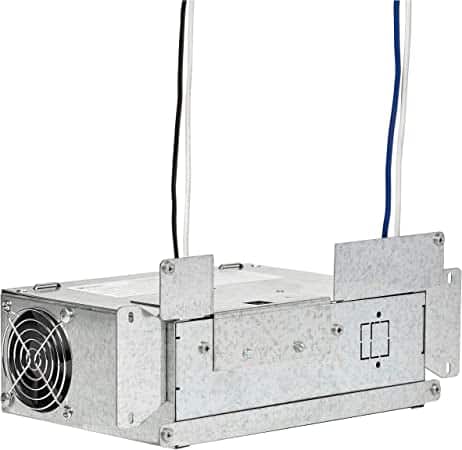
Pros
- Old converter models’ direct replacement
- Smart charging in three stages
- Lightweight and portable
Cons
- Greater spending limit
- To be the greatest of the best, extra purchases are required.
Looking for a dependable replacement for your present converter if you own a Class A, B, or C motorhome? Given that it is advertised as a straight replacement for any outdated converters bearing the Parallax trademark, the PARALLAX POWER 45RU Converter is a fantastic option for you!
With dimensions of 4 x 10 x 7.5 inches and a weight of just under four pounds, the Parallax converter may be the smallest on our list without sacrificing functionality.
You won’t need to worry about manually maintaining your battery since the 45RU is a three current stage 45 Amp converter and battery charger.
When your batteries are completely charged, this converter will continue to charge them without stopping.
If you happen to be replacing one of the Parallax or MagneTek 7345 power centers, the 45RU is a straight replacement.
By adding a second Parallax module, this device may also be updated to TempAssure technology to enhance battery charging.
However, another Parallax device will set you back some more cash since this converter continues to rank well on our list in terms of affordability.
In case you have questions regarding the converter you need or the best way to install it, Parallax also offers an excellent customer support line.
If you own a motorcoach, this should be a straight replacement for your existing converter.
If you have any further inquiries, just give Parallax a call!
Conclusion
Even understanding your requirements and thinking you can install it without assistance from a professional might be a difficult undertaking when shopping for an RV converter.
Whatever your needs, the converters on this list are trustworthy, well regarded, and reasonably priced.
Although it’s required, replacing your converter might be a difficult operation.
Maintain your batteries, be aware of the amperage you need, and get a companion.
With these things in mind, installing a new converter may be a snap!

